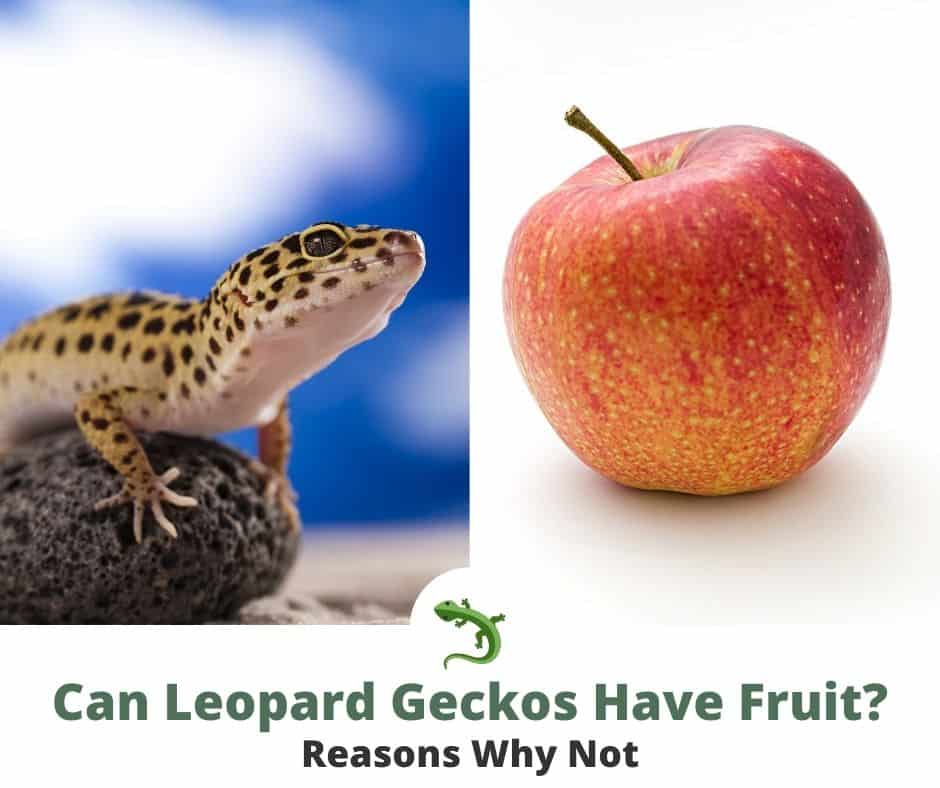Many websites recommend fruit for Leopard geckos, but we recommend that you avoid feeding your Leopard gecko fruit.
In this guide, you’ll learn:
- Why fruit is NOT ok for Leopard geckos
- Other ways to add variety to their diet

Leopard geckos are primarily insectivores that feed on insects or bugs such as small locusts, crickets, silkworms, mealworms, waxworms, superworms, grasshoppers, springtails, and even nestling mice or pinky mice in captivity. In the wild, they hunt for these insects which is why most geckos in captivity will usually not be interested in food that does not move.
In fact, hatchling Leopard geckos eat pinhead crickets soon after their first shed. Hatchlings and juveniles are known to be quite voracious feeders and will go through as much as 20 pinhead crickets in one sitting. Adult geckos will start to eat less as they reach their full size after about 1-2 years.
Can Leopard Geckos Eat Fruit?
No, Leopard geckos are insectivores and feed primarily on insects. Since these reptiles are insectivores, their bodies are not designed to digest fruits and vegetables.
Some research has shown that Leopard geckos can eat fruit and they do just because it was available to them in captivity but since they cannot digest it, it poses no benefits. It may even be harmful as the sugars in fruits and a soft diet can lead to plaque buildup. Sugars can cause plaque buildup, which can lead to Leopard gecko mouth rot.
📚 Read More >> What Do Leopard Geckos Eat?
Important
It is highly recommended that Leopard geckos be fed a diet that is as close to natural as possible.
Why can’t Leopard Geckos Eat Fruit?
Simply put, a Leopard gecko’s stomach is not designed to eat or digest fruits and vegetables.
Leopard geckos are lizards that lack a caecum (or cecum) which is a pouch-like structure between the small and large intestines designed to catch undigested food. In reptiles, it serves as a way for herbivores (or omnivores) to digest cellulose which is the major component of vegetables, plants, and fruit.
In a few herbivorous or omnivorous reptile species, such as bearded dragons, the caecum is found at the junction between the small and large intestines. This allows these reptiles to digest plant matter.
The digestive tract of insectivores has a better developed small intestine which may be the reason why insectivores have no need for the caecum. This allows most of the digestion of hard exoskeleton to happen in the small intestine for maximum nutrient absorption.
Herbivores have a longer and more acidic digestive tract or stomachs designed to digest plant matter which is fibrous and takes longer to metabolize.
The skull and jaws of insectivores are also less robust than those of herbivores since herbivores have to chew their food more to pre-digest the tough cellulose and fibers.
How can you vary the diet of Leopard geckos?
The best way to provide your gecko with a varied diet is to include other insects such as Dubia roaches, butterworms, hornworms, or super worms as a treat. If you have a picky eater, then the variety can help pick up your Leopard gecko’s appetite.
However, worms can have a high fat content so it’s best to feed these in moderation. Avoid bugs that glow such as fireflies as these are toxic to reptiles.
Pro-tip
Make sure your feeder insects are from reputable breeders to ensure they are free from harmful insecticides or pesticide residues.
If you insist on offering your Leopard gecko fruit and vegetables then the best way to do it is via gut-loading. Feeder insects such as crickets can be offered fresh fruits and vegetables which is a good way to increase their nutritional value for your gecko.
Crickets or even small locusts can be fed a variety of fruits and vegetables such as apples, oranges, bananas, carrots, squash, and leafy greens. Opt for fruits that are high in calcium and low in phosphorus (high calcium to phosphorus ratio) such as apples, peaches, papayas, and mangoes. Avoid those that may be toxic to your Leopard gecko such as starfruit, rhubarb, and avocado.
Gut load your feeder insects a day before feeding them to your gecko. Calcium powder or dust can also be sprinkled on feeder insects to increase their nutritional value.
When can you offer fruit to Leopard geckos?
In some instances when your gecko needs liquid supplements or vitamins and needs to be fed with a slurry when they are recovering from an illness, then your vet may prescribe including nutritious fruits and vegetables to their diet. These will have to be blended with their usual food and hand-fed as a slurry according to the instructions from your vet.
Conclusion
Leopard geckos have a digestive system designed to deal primarily with insects. They cannot readily digest fruits and vegetables and so cannot gain useful nutritional benefits from eating them. It’s best to stick with the natural diet of Leopard geckos supplemented with calcium, vitamin D3, and multivitamins to make sure they are healthy in captivity.
FAQs
Is fruit good for geckos?
No. Geckos cannot digest fruit and vegetables so they cannot benefit from their nutritional value. The sugars may even cause plaque buildup that can eventually lead to mouth rot.
What fruits can geckos eat?
None. Leopard geckos cannot digest fruit so they cannot benefit from their nutritional value. The sugars may even cause plaque buildup that can eventually lead to mouth rot.
Further reading
Overview on Leopard geckos:
ADW: Eublepharis macularius: INFORMATION
Management and care of Leopard geckos:
MANAGEMENT, CARE, AND COMMON CONDITIONS OF LEOPARD GECKOS
A detailed study on Leopard geckos:
Natural history and biology of hobbyist choice leopard gecko Eublepharis macularius
Short article on care:
Leopard Gecko Husbandry and Nutrition
Helpful books about reptiles:
Handbook of Exotic Pet Medicine
Reptile Medicine and Surgery in Clinical Practice | Wiley Online Books


